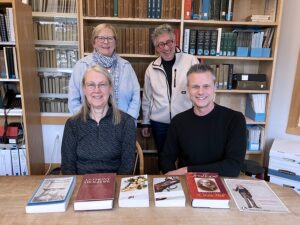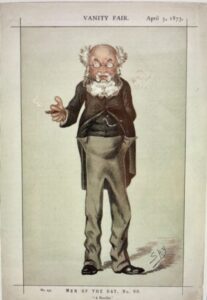Scheming politicians, female agency, marital bargains, and ambitious sociopaths were all up for discussion at a recent meeting in Truro. This was not a select board hearing, however. It was a group gathered to talk about the work of a prolific 19th-century British author who many people have never heard of.

For the past 10 months, the writing of Anthony Trollope (1815-1882) has brought seven local residents to the Truro Public Library (and online in the off-season) twice a month in a reading group called “A Taste for Trollope.” Their backgrounds are varied: there’s an international orchestra conductor, a former college provost, a travel technology specialist, and a marketing manager. But they are all now ardent fans, delving into the lives of Trollope’s vivid characters and exploring a Victorian-era history that often resonates with today’s news.
“Something has clicked,” says Lynne Rosenbaum of Truro about the group’s success. “The more you read of him, the more you appreciate him.” It’s not only the writer’s rich and diverse plots but also his characters that fascinate readers, she says.
Before joining the group, most of the members hadn’t read Trollope or had done so only briefly decades ago before. They acknowledge that, except for academics and English majors, most people they know haven’t tried — or even heard of — Trollope’s books. Truro’s Richard Coughlin says the author is “overlooked” compared to contemporaries like Charles Dickens.
That’s despite the fact that Trollope, a post-office official, was prolific. He wrote 47 novels and dozens of short stories and travel books. The reason he’s not familiar to everyone, they guess, is that none of his works ever became a Hollywood movie.
There were a few BBC film adaptations with actors including Donald Pleasence, Nigel Hawthorne, Alan Rickman, and Matthew Macfadyen. But Hollywood never popularized Trollope’s work as it did Dickens’s and Jane Austen’s. The staying power of Trollope’s characters and stories has, however, inspired a worldwide Trollope Society since 1987 (with one U.S. social group in Boston).
Some of these Cape Cod Trollope followers had been urged by friends to join in; others took a chance on the unknown last spring when they saw library posters or noticed a classified ad for the group in the Independent. Now dividing each 500-plus-page book over three meetings, they’ve finished Trollope’s six-volume Chronicles of Barsetshire, tried Wilkie Collins’s “Victorian sensation” The Woman in White for contrast, and recently embarked on Trollope’s six Palliser novels, which they aim to finish by summer’s end.
The idea for the group came from Jo Citron, a retired lawyer who returned to teaching over the past decade by offering courses in 19th-century British literature — including one contrasting Trollope with his friend George Eliot — through the Harvard Institute for Learning in Retirement. After moving to Truro, she wanted to meet new people with similar interests.
Citron considers Trollope one of the great 19th-century realists, whose work fell out of fashion before enjoying a renaissance during World War II. His strength: “He is absolutely believable because of the completeness with which he has imagined his world and the devotion he feels toward it personally,” she says. “He is absolutely committed to the reality of those characters, so the reader believes in them absolutely.”
Trollope stands out because his characters grow and age over multiple novels, exploring life beyond the more typical romantic endings of novels of the era. “He follows some characters from their late teens to their 60s and 70s,” says David Charles Abell of Provincetown. “So, you’re seeing the arc of an entire life. You really feel like you know these people.”
Trollope spoils his own endings. “He tells you exactly what is going to happen and who’s going to end up with whom, and you still want to read it, even if it’s 800 pages long,” says Rosenbaum. “He’s not relying on suspense. He’s relying on your sense of wonder about how the characters get to that point.”
“He’s an easy novelist to like,” Citron says, “and much easier to talk about than I’d feared. I’ve learned a lot from this group of readers.”

While A Taste for Trollope digs deeper than many book groups — a recent meeting about 1864’s Can You Forgive Her? included references to Trollope’s autobiography — it’s not a class. Citron kicks off discussions and offers in-meeting and emailed context on history and literature, but those are optional extras. Members say they appreciate the information because it makes their encounters with anachronism more meaningful.
“There are things I don’t understand because I don’t know a lot of the history of that time period,” says Leslie Starr of Provincetown. “So, it’s very useful to have Jo say, ‘They’re referring to the Reform Act of 1832 and here’s what happened in that act.’ ”
Citron recently created an invitation-only online site, like those used by universities, so group members can easily access her Trollope-Eliot course, background reading, articles, and details on books and meetings.
The readers say hearing what others noticed or focused on is why they enjoy getting together. Abell, a conductor, sometimes brings up operas from the same period. Coughlin, whose career was in college libraries, enjoys dissecting key quotes and mapping out character relationships.
Past connects to present, Starr notes, when Trollope writes about Victorian women’s finances and fates being almost entirely controlled by men and you consider today’s abortion rights debate. Abell notes that the books’ Parliament members wrestle with voting for party versus principles.
Curiosity about the era prompted the group’s decision to expand next fall’s reading to other 19th-century authors. New members are welcome now or then, and Citron thinks more Cape readers might want to join in — even for a single book — when they try Eliot’s Middlemarch, for example, or something by Dickens or Henry James.
“Our group seems to be evolving from a single author,” Abell says, “but Trollope is our touchstone because, well, we love him.”
A Taste for Trollope meets the first and third Thursday of each month from 4 to 5:30 p.m. on Zoom and, later in the year, at the Truro Public Library, 7 Standish Way.



